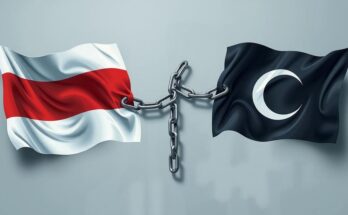The Democratic Republic of the Congo is facing a humanitarian crisis due to armed conflicts, with over 7,000 casualties and 80,000 displaced. The M23 Movement’s rebellion is the primary conflict driver, targeting key areas. Christians are mainly endangered by the Islamic State Central Africa Province. The DRC’s wealth in minerals fuels the violence, exacerbating poverty and food shortages, highlighting the urgent need for humanitarian assistance and prayers for peace.
The Democratic Republic of the Congo (DRC) is currently enduring a severe humanitarian crisis as a result of ongoing armed conflict, with the death toll reaching at least 7,000 and approximately 80,000 individuals displaced. Among these victims are numerous Christians, who face threats from the Islamic State Central Africa Province amidst the prevailing violence, which shows little indication of abating.
The recent escalation of violence in the DRC is largely attributed to the M23 Movement, which has a history of rebellion against the Congolese government. On January 27, 2025, the M23 captured Goma, the capital of North Kivu, and subsequently Bukavu, the capital of South Kivu. The group is accused of civilian massacres and their leaders have alluded to the possibility of advancing towards the capital, Kinshasa, inciting fears of a governmental coup.
The M23 Movement, named after a peace agreement it rejects, was established in 2012 to purportedly defend the rights of the Tutsi ethnic minority. Although its initial rebellion was unsuccessful, the group re-emerged with support from Rwanda in late 2021. While the Rwandan government denies involvement, many experts assert that 3,000 to 4,000 Rwandan troops are aiding the M23 fighters on the ground.
Although many Christians have been killed amid this turmoil, the M23 is not specifically targeting them. Instead, another group, the Islamic State Central Africa Province (ISCAP), has claimed the lives of nearly 6,000 Christians since its allegiance to the Islamic State in 2017. The increased activities of ISCAP, which boasts of mutilations and killings on social media, have capitalized on the chaos from the M23 advances.
The conflict has deep roots in the DRC’s mineral wealth, which includes abundant resources such as coltan, vital for technology manufacturing. The M23’s control over these mining areas allows it to generate significant revenue, earning around $800,000 per month through taxation. Reports indicate that child labor remains prevalent in the mining sector, with approximately 40,000 children estimated to be engaged in such activities across the region, facing hazardous and inhumane conditions.
In addition to the humanitarian toll, the crisis has exacerbated food insecurity; as of June 2024, around 25 million individuals in the DRC, constituting a quarter of the population, are suffering from severe hunger. The ongoing conflict has severely disrupted supply routes, leading to increased theft of livestock and crops while hindering humanitarian aid efforts.
The DRC exemplifies an overlapping crisis of civil unrest, poverty, human rights abuses, and terrorism. Each facet is interconnected, leading to increasing fatalities and suffering among its population. As conditions deteriorate, urgent prayers are solicited for peace and stability in the DRC, alongside efforts to ensure humanitarian aid reaches those in dire need. Support for rebuilding lives and infrastructure, as well as for those enduring persecution for their faith, remains crucial, alongside initiatives from humanitarian organizations like Barnabas Aid providing emergency assistance.
The Democratic Republic of the Congo is beset by a multifaceted humanitarian crisis rooted in violent conflict, notably driven by the M23 rebel movement. This ongoing violence has led to widespread civilian suffering, with thousands of deaths and extensive displacement. Concurrently, Christians face targeted aggression from ISCAP, further compounding the humanitarian challenges. The DRC’s rich mineral resources are at the heart of the conflict, perpetuating a cycle of violence and poverty. As the situation worsens, the need for humanitarian aid and international support becomes increasingly urgent.
Original Source: www.barnabasaid.org




